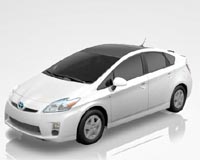 |
Berlin (UPI) Aug 19, 2009 Germany on Wednesday unveiled a national strategy to make the country a world leader in sustainable mobility and have 1 million electric cars cruise its Autobahn highways by 2020. "In 2030, this could be over 5 million. By 2050, traffic in towns and cities could be predominantly without fossil fuels," the National Electric Mobility Plan reads. It includes $712 million for sustainable mobility research and development, including programs to develop the charging station infrastructure and boost battery technology, an area of expertise that has long belonged to Asia. "It is our goal to make Germany into the market leader for electric mobility," Economy Minister Karl-Theodor zu Guttenberg said after the Cabinet approved the plan. The plan also mulls a $7,000 rebate for Germans buying an electric car starting in 2012, and it earmarks money for eight model regions aimed at learning about driving patterns and how to best integrate electric mobility into the German electricity grid. The scheme also supports research and development into fuel cells and biofuels. Berlin hopes to introduce the first 100,000 electric cars onto the German auto market by 2012, at a time when German car giants including Daimler and BMW are due to have EVs market-ready. Volkswagen, Europe's largest carmaker, won't introduce a fully electric vehicle until 2013, and it took Daimler until this June to launch its first hybrid vehicle -- roughly a decade after Toyota introduced its Prius. The German car market today includes roughly 40 million vehicles. Elsewhere, companies are faster. Japan's Mitsubishi Motors Corp. earlier this year launched its electric vehicle, the $48,000 i-MiEV. Competitor Nissan in August unveiled a mass-market battery-powered car called the Leaf, which the firm said will be in showrooms in Japan, the United States and Europe by the end of 2010. The Chevrolet Volt, a plug-in hybrid that relies on its motor only for electricity generation, is to be sold by early 2011. Germany's politicians are nevertheless optimistic that the German industry, famous for its successes when it comes to gasoline and diesel engine efficiency, can meet the growing global competition. "We are very confident that we in Germany can provide enough of an impulse to compete with the United States and Asia," Transport Minister Wolfgang Tiefensee said Wednesday at a news conference in Berlin. Germany supports sustainable mobility to help meet the country's ambitious climate protection targets and reduce dependency on oil imports, the minister said. Critics warned that many of the model regions may see cars driving with "dirty electricity" generated in coal-fired or nuclear power plants. "Electric cars only drive environmentally friendly if they are charged with power from renewable sources," Hermann Albers, the head of the German Wind Energy Association, said in a statement. "That's why the pilot projects the big utilities are involved in harbor the danger that traditional electricity is used. But we need concepts with renewable power." Share This Article With Planet Earth
Related Links Car Technology at SpaceMart.com
 Toyota to raise output, buy batteries from Sanyo: reports
Toyota to raise output, buy batteries from Sanyo: reportsTokyo (AFP) Aug 19, 2009 Toyota Motor has raised its production target for this year and plans to start buying batteries from Sanyo Electric to meet brisk demand for its hybrid vehicles, reports said Wednesday. The world's largest automaker now aims to produce 5.95 million Toyota-brand vehicles in 2009, up from a previous goal of 5.8 million, the Nikkei business daily and other media reported without naming their ... read more |
|
| The content herein, unless otherwise known to be public domain, are Copyright 1995-2009 - SpaceDaily. AFP and UPI Wire Stories are copyright Agence France-Presse and United Press International. ESA Portal Reports are copyright European Space Agency. All NASA sourced material is public domain. Additional copyrights may apply in whole or part to other bona fide parties. Advertising does not imply endorsement,agreement or approval of any opinions, statements or information provided by SpaceDaily on any Web page published or hosted by SpaceDaily. Privacy Statement |